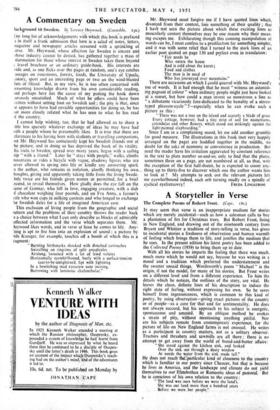A Storyteller in Verse The Complete Poems of Robert Frost.
(Cape. 185.) IT may seem that verse is an inappropriate medium for stories which are merely incidental—such as how a salesman calls to buy a plantation of firs for Christmas trees. But Robert Frost, living in New England, and drawing out of the nineteenth century from Bryant and Whittier a tradition of story-telling in verse, has given to incidental stories a freshness of observation and human warmth of feeling which brings them to life, and justifies the medium that he uses. In the present edition his latest poetry has been added to the Collected Poems (1939) to bring. them up to date.
With all his stories he imparts the feeling that there was much, much more which he would not say, because he was writing in a mood and a tradition which preferred the understatement and the sweeter unsaid things. Wordsworth's poem " Michael " is the origin, if not the model, for many of his stories. But Frost writes on a different level and from a different experience. To him the details which he notices, the outlines of the story, are vital. He leaves the clean, definite lines of his description to induce the right state of feeling, without expressing his own. So he saves himself from ingenuousness, which is common to this kind of poetry, by using observation—giving exact pictures of the country or of people—as a cure for that and for sentimentality. He does not always succeed, but his approach to his subject is energetic, spontaneous and amused. By an oblique method he evokes a strain of pity, without mentioning anything pitiful. Nor are his subjects remote from contemporary experience, for the picture of life. on New England farms is not unusual. He writes as a participant in country -matters, not as a solitary observer. Tractors and thrashers and sawmills are all there ; there is no attempt to get away from the world of bread-and-butter affairs:
"She stood against the kitchen sink, and looked Over the sink out through a dusty window At weeds the water from the sink made tall."
He does not reach the particular kind of closeness to the country whiCh is familiar in our poetry since Chaucer, but that is because he lives in America, and the landscape and climate do not yield themselves to our Elizabethan or Romantic ideas of pastoral. But he is conscious of his own relation to the country: "The land was ours before we were the land's. She was our land more than a hundred years Before we were her people."
In a pastoral poem which is even more characteristic of his personal attachment to the country he writes:
" Let those possess the land and only those, Who love it with a love so strong and stupid That they may be abused and taken. advantage of And made fun of by business, law and art ; They still hang on."
" No one can really hold," he writes in a foreword on poetry, " that the ecstasy should be static and stand still in one place." He sees narrative as ending in " a clarification of lift—not neces- sarily a great clarification, such as sects and cults are founclzd on,
r but in a momentary stay against confusion." Probably his best work is not the short story of a few hundred lines, but the much shorter poem in narrative of about thirty lines, like " Something there is that doesn't love a wall," where the observation is more compact and the feeling more intense. These last qualities are more frequent in his latest poetry. Even in his lyrics there is a move- ment, a sense of things being done. In his longer poems—though none is really long—there is an almost too deliberate flatness, not the kind which makes a yawning gap in an " elevated " poem, but a sort of dilution which has spread through the whole poem. Although this has the merit of givipg his poetry a natural con- versational air, the air sometimes drifts across into his more serious commentary and criticism of life, and gives them an atmosphere of easy complacency—of having discovered equilibrium on a rather low level. But it is his impulsive mere than his conscious criticism of life which is important—the sheer happiness and childlike wonder of so many of his poems, the human and sincere directness with which he describes what he has seen and done, the humour of his stories, the sadness of their situations, and the clear, natural



































 Previous page
Previous page